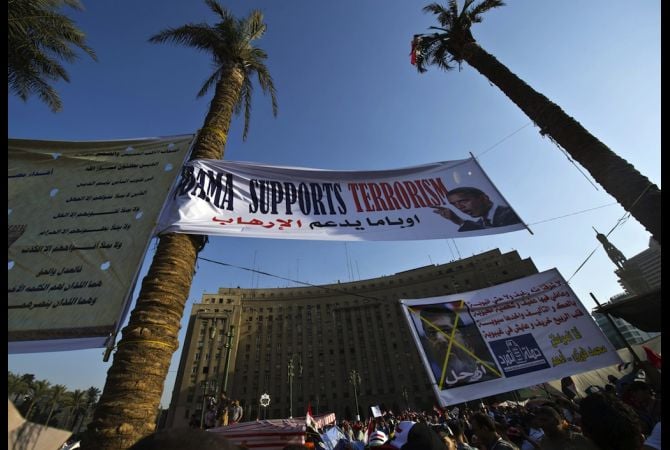
A sign denouncing U.S. President Barack Obama and his supposed support of deposed Egyptian leader Mohamed Morsi hangs above protesters in Cairo, Egypt on June 30, 2103. Photo: KHALED DESOUKI/AFP/Getty Images
Two weeks after Mohamed Morsi was ousted as the leader of Egypt, chaos still reigns. According to state-run media, seven people died on Monday, July 15, in violent skirmishes between Morsi supporters and opponents. An interim government is trying to instill some sense of ruling stability, but the widely supported Muslim Brotherhood (Morsi’s party) and others don’t consider it legitimate.
Various factions struggling for power and influence in Egypt would be hard-pressed to find anything to agree on these days except when it comes to the United States. Each group seems to think the U.S. is to blame for its misfortune.
To those who demanded and eventually secured Morsi’s removal, the U.S. unjustly continued to support his regime even as its hold on democracy faltered. The U.S., particularly through its ambassador to Egypt Anne Paterson, has been criticized for denouncing protests and advocating for the release of Morsi, who is currently being held by the Egyptian military. Protesters in Cairo have made their feelings known with signs such as the one leading this article, labeling Obama a terrorist for supporting the Muslim Brotherhood.
Morsi’s backers claim the U.S. support of Egypt’s military contributed to Morsi’s downfall. They note that the U.S. has thus far not labeled recent events a “coup.” Doing so would require suspension of all aid to Egypt, which now runs about $1.5 billion annually (much of it going to military use), to comply with U.S. policy of not supporting governments that come to power through military action. “Down with the agents of America!” seems to be the sentiment of Morsi supporters.
How can both sides be so sure America is against them? Perhaps because its hard to tell what the U.S. stance is. President Barack Obama has been noticeably quiet on events in Egypt. The Economist states he is trying to “quietly influence events” behind the scenes but does not specify in what way or provide evidence as to the means of doing this.
While it may be true that “the American president simply lacks the leverage to influence events in Egypt,” to me this is not a reason to avoid speaking out on the issue. Perhaps the U.S. would have a greater degree of leverage if people (inside and outside of Egypt) knew where it stood on the change power, and whether it is considered a coup or not.
Granted, there is no easy choice for Obama and the U.S. in this case. As The Economist article (referenced above) points out, some have supported his reserving judgment until it becomes clearer where the dust will settle in Egypt. Others have criticized his inaction, believing that the U.S. is unacceptably lying silent while Egyptian democracy falls.
Though I wonder if it would be better for Obama/the U.S. to take a position, and take whatever criticism comes his/its way for it, than to not have a position at all.